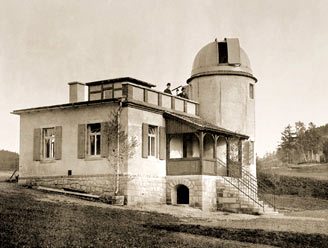Glashütte Observatory/en: Unterschied zwischen den Versionen
Keine Bearbeitungszusammenfassung |
Keine Bearbeitungszusammenfassung |
||
| Zeile 2: | Zeile 2: | ||
{{other languages|[[Sternwarte Glashütte|de]]}} | {{other languages|[[Sternwarte Glashütte|de]]}} | ||
[[Bild:Sternwarte.jpg|framed|Glashütte Observatory, Historical Photo]] | [[Bild:Sternwarte.jpg|framed|Glashütte Observatory, Historical Photo]] | ||
[[Müller, Hugo|Hugo Müller]] led the way and supplied a plot of land in Dittersdorfer Weg for the construction of an observatory, which began construction when the foundation stone was set on August 27, [[1906]]. When the observatory opened four–years later in 1910 it cemented Glashütte as the hub of Germany’s watchmaking industry. | [[Müller, Hugo|Hugo Müller]] led the way and supplied a plot of land in Dittersdorfer Weg for the construction of an observatory, which began construction when the foundation stone was set on August 27, [[1906]]. When the observatory opened four–years later in 1910, on 26 June, it cemented [[Glashütte]] as the hub of Germany’s watchmaking industry. | ||
It was furnished with: a refracting telescope to precisely measure the Earth’s place in the Milky Way galaxy; one of the most accurate timepieces made at that time: a [[marine chronometer]]; and a donation from Glashütte’s leading industrialist, [[Trapp, Ludwig (1865-1949)|Ludwig Trapp]], a precision pendulum clock. Finally, German watchmakers had an exact reference to precisely quantify and further improve the accuracy of their craft. | It was furnished with: a refracting telescope to precisely measure the Earth’s place in the Milky Way galaxy; one of the most accurate timepieces made at that time: a [[marine chronometer]]; and a donation from Glashütte’s leading industrialist, [[Trapp, Ludwig (1865-1949)|Ludwig Trapp]], a precision pendulum clock. Finally, German watchmakers had an exact reference to precisely quantify and further improve the accuracy of their craft. | ||
Version vom 8. Februar 2009, 21:05 Uhr
Glashütte Observatory
| other languages: de |

Hugo Müller led the way and supplied a plot of land in Dittersdorfer Weg for the construction of an observatory, which began construction when the foundation stone was set on August 27, 1906. When the observatory opened four–years later in 1910, on 26 June, it cemented Glashütte as the hub of Germany’s watchmaking industry.
It was furnished with: a refracting telescope to precisely measure the Earth’s place in the Milky Way galaxy; one of the most accurate timepieces made at that time: a marine chronometer; and a donation from Glashütte’s leading industrialist, Ludwig Trapp, a precision pendulum clock. Finally, German watchmakers had an exact reference to precisely quantify and further improve the accuracy of their craft.
As of early 2006, Wempe has established a Chronometer Observatory at Glashütte in Saxony. Official Chronometer Certificates are now being issued under the auspices of the German standards (DIN) under government oversight and authority.